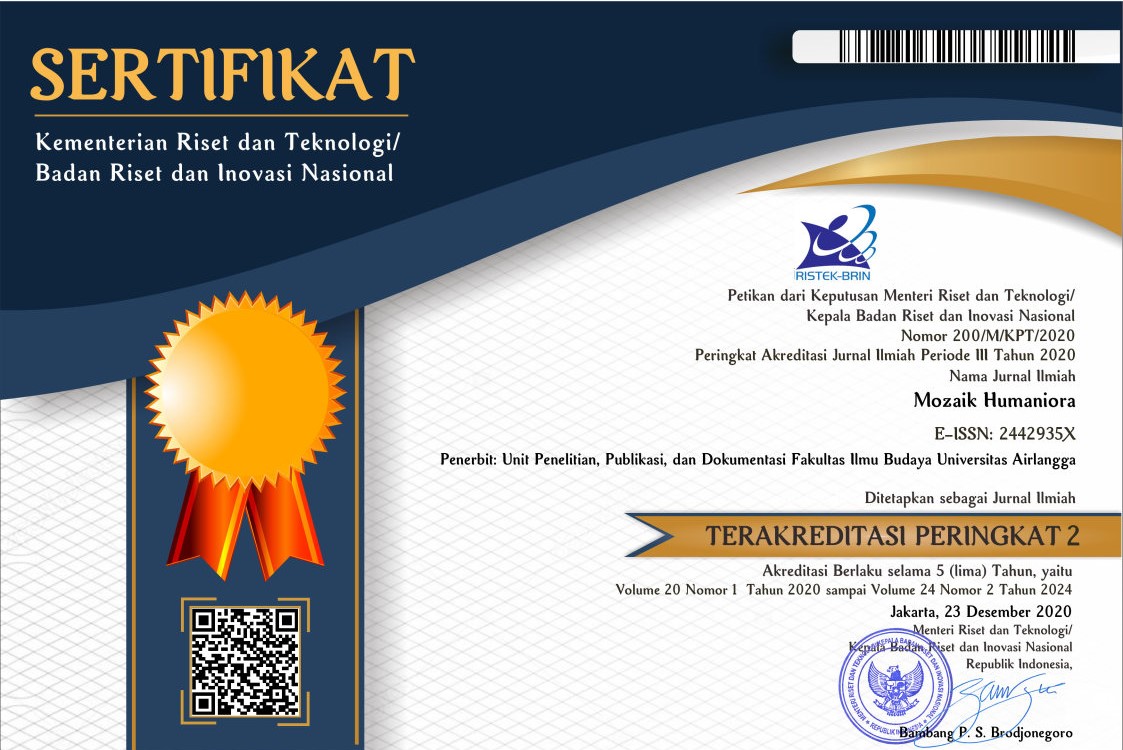Modernity of Women Subject in Eka Kurniawan’ Cantik Itu Luka (2002): A Study of Post-Colonial Feminist Literary Criticism
Downloads
This study aims to dismantle the narrative of the female subject’s modernity which was built by the author as a representative of a social group or class. In order to achieve this objective, the researchers used qualitative approach, which prioritizes data quality to data size. The data in this study is the novel Cantik Itu Luka by Eka Kurniawan, and other information related to the research topic. Then, the data were analyzed using binary opposition deconstruction and postcolonial feminism theory. Data analysis focuses on the narrative structure of the text and its ideas regarding colonial discourse and the narrative construction of the modernity of female subjects, as well as the author's historical and sociological context in relation to the text. The results show that the construction of the female subject presented in the text Cantik Itu Luka (2002) is a woman who is resistant to the discourse of modernity. In the context of colonial discourse, the female subject is a woman who participates in the rebellion against patriarchal cultural oppression and globalization. The discourse of modernity built by Eka Kurniawan is that women are required to maintain their national identity amidst the commotion of global culture. The construction of the female subject in the text is an ideal formed by male critical intellectual groups to represent and advocate women who have difficulty getting space and position in the social order.
Afdholy, N. 2023. “Screams of Disagreement in Eka Kurniawan’s Novels: The Politics of Aesthetics Perspective.” International Journal of Literary Humanities 21 (1), 89—98. DOI: 10.18848/2327-7912/CGP/v21i01/89-98.
Bahardur, I. 2020. “Subaltern Jugun Ianfu dalam Cerpen Kapotjes dan Batu yang Terapung Karya Faisal Oddang: Tinjauan Poskolonial Gayatri Spivak.” Kembara: Jurnal Keilmuan Bahasa, Sastra, dan Pengajarannya 6 (2), 188–204. DOI: 10.22219/KEMBARA.V6I2.13545.
Damayanti, R. & M. I. Nasution. 2022. “Refleksi Perjuangan Perempuan pada Masa Kolonial dalam Novel Cantik Itu Luka Karya Eka Kurniawan.” Persona: Kajian Bahasa dan Sastra 1 (1), 64–76. DOI: 10.24036/JPERS.V1I1.12.
Djajanegara, S. 2000. Kritik Sastra Feminis: Sebuah Pengantar. Jakarta: Gramedia Pustaka Utama.
Gatra, S. 2022. “Kaum Intelektual, Kekuasaan, dan Harapan Perubahan.” Kompas, https://nasional.kompas.com/read/2022/05/25/16044641/kaum-intelektual-kekuasaan-dan-harapan-perubahan?page=all, 25 Mei.
Hamam, K. 2014. Confining Spaces, Resistant Subjectivities: Toward A Metachronous Discourse of Literary Mapping and Transformation in Postcolonial Women’s Writing. Cambridge Scholars Publishing.
Hayati, Y. 2012. “Dunia Perempuan dalam Karya Sastra Perempuan Indonesia (Kajian Feminisme).” Humanus 11 (1). DOI: 10.24036/jh.v11i1.626.
Junita, A. 2022. “Eka Kurniawan dan Moooi Pustaka: Aku Ingin Hidup dengan Dikelilingi Orang-orang yang Membaca Literatur.” Nongkrong.Co., https://www.nongkrong.co/apresiasi/pr-4313878476/eka-kurniawan-dan-moooi-pustaka-aku-ingin-hidup-dengan-dikelilingi-orang-orang-yang-membaca-literatur, 14 Juli.
Kurniawan, E. 2002. Cantik Itu Luka. Jakarta: Gramedia Pustaka Utama.
________. 2023. Tragedimu Komediku. Sleman: Tanda Baca.
Kurniawati, A., L. Liana, N. Putriani Asharina, & I. Permana. 2018. “Kajian Feminisme dalam Novel Cantik Itu Luka Karya Eka Kurniawan.” Parole : Jurnal Pendidikan Bahasa dan Sastra Indonesia 1 (2), 195—206. DOI: 10.22460/P.V1I2P.
Lewis, R. & S. Mills. 2013. Feminist Postcolonial Theory a Reader. Taylor & Francis.
Li, C. & L. Lin. 2020. “Postcolonial Theory: A Critical Introduction by Leela Gandhi.” Ariel: A Review of International English Literature 51 (4), 191—195. DOI: 10.1353/ari.2020.0034.
Morton, S. 2008. Gayatri C. Spivak: Etika, Subalternitas, dan Kritik Penalaran Poskolonial, diterjemahkan oleh Wiwin Indiarti. Yogyakarta: Penerbit Pararaton.
Ozkazanc-Pan, B. 2012. “Postcolonial Feminist Research: Challenges and Complexities.” Equality, Diversity and Inclusion 31 (5—6), 573—591. DOI: 10.1108/02610151211235532/FULL/XML.
Parashar, S. 2017. “Feminism and Postcolonialism: (En)gendering Encounters.” Postcolonial Studies Culture Politics Economy 19 (4), 371—377. DOI: 10.1080/13688790.2016.1317388.
Rangkuti, I. S. 2018. “Eka Kurniawan, Sastrawan, dan Karyanya.” Basabasi.Co., https://basabasi.co/eka-kurniawan-sastrawan-dan-karyanya/, 1 Februari.
Riach, G. 2017. An Analysis of Gayatri Chakravorty Spivak’s “Can The Subaltern Speak?” Macat Library.
Riyanti, E., T. Tjahjono, & Suhartono. 2023. “Ekspresi Seksualitas Perempuan dalam Novel Saman dan Larung Karya Ayu Utami.” Edukasia: Jurnal Pendidikan Dan Pembelajaran 4 (2), 1211—1222. DOI: 10.62775/edukasia.v4i2.418.
Saputra, A. D. 2011. “Perempuan Subaltern dalam Karya Sastra Indonesia Poskolonial.” Literasi: Indonesian Journal of Humanities 1 (1), 16—30.
Setiawan, R. 2018. “Subaltern, Politik Etis, dan Hegemoni dalam Perspektif Spivak.” Poetika: Jurnal Ilmu Sastra 6 (1), 12—25. DOI: 10.22146/POETIKA.V6I1.35013.
Susanto, D. 2016. Pengantar Kajian Sastra. Yogyakarta: CAPS (Center for Academic Publishing Service).
Wijayanti, I. 2021. “Kemerosotan Nilai Moral yang Terjadi pada Generasi Muda di Era Modern.” SocArXiv Papers. DOI: 10.31235/osf.io/w9m4x.
Yanti, S. Y. 2022. “Perbudakan Seksual Perempuan Indonesia: Jugun Ianfu pada Masa Pendudukan Jepang Tahun 1942—1945.” Factum 11 (2). DOI: 10.17509/factum.v11i2.41974
Copyright (c) 2024 Maisyaroh Febriana Putri

This work is licensed under a Creative Commons Attribution-ShareAlike 4.0 International License.

Mozaik Humaniora is licensed under a Creative Commons Attribution-ShareAlike 4.0 International License. Both authors and Mozaik Humaniora agree with the following attribution of journal:
1. Copyright of this journal is possession of Author, by the knowledge of the Editorial Board and Journal Manager, while the moral right of the publication belongs to the author.
2. The journal allows the author(s) to retain publishing rights without restrictions
3. The legal formal aspect of journal publication accessibility refers to Creative Commons Attribution Share-Alike (CC BY-SA).
4. The Creative Commons Attribution Share-Alike (CC BY-SA) license allows re-distribution and re-use of a licensed work on the conditions that the creator is appropriately credited and that any derivative work is made available under "the same, similar or a compatible license”. Other than the conditions mentioned above, the editorial board is not responsible for copyright violation.


















